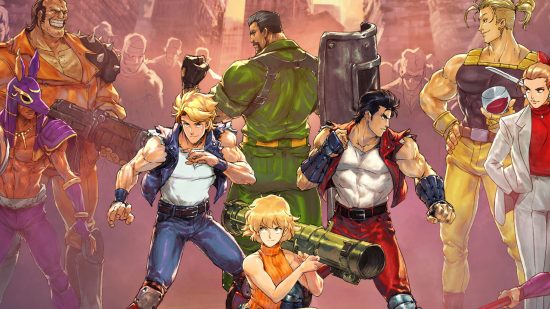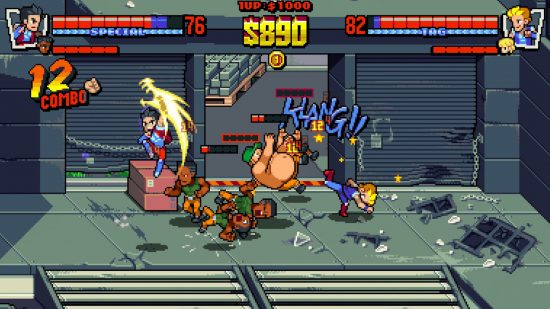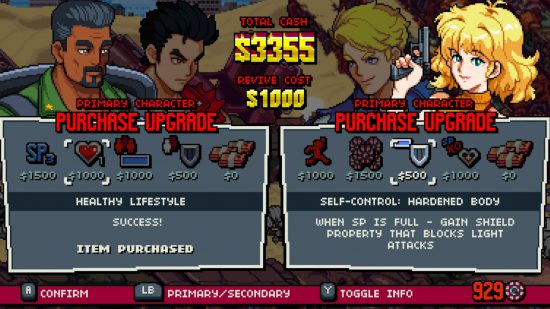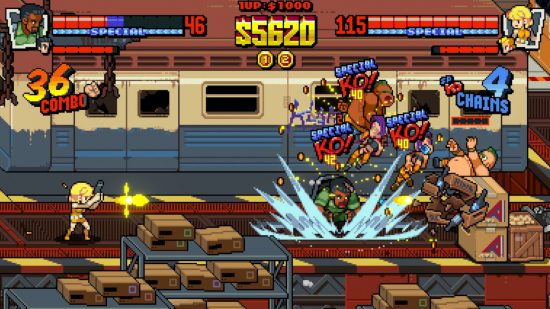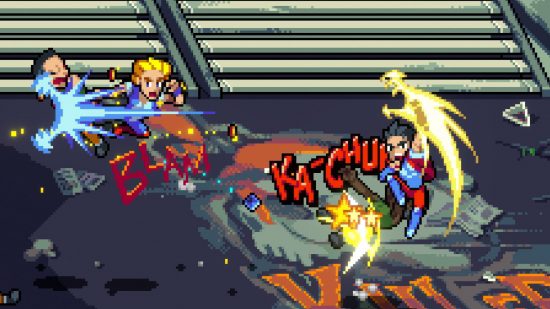Our Verdict
While engaging gameplay, roguelike concepts, and a big replayability factor bring Double Dragon back from the dead, Rise of Dragons’ late-game struggles and a skew-whiff lives system slightly detract from a promising revival.
You don’t get many beat ‘em ups these days. The general consensus seems to be that the genre peaked in the nineties, just like 3D platformers and Pogs. Still, the odd beat ‘em up still arrives every now and then, and I like to play them when I can, just for that hit of nostalgia if nothing else. So, with the offer of a Double Dragon Gaiden: Rise of the Dragons Switch review copy for Pocket Tactics, I jumped – a jump kick, it was – at the chance to take on a new contender in the semi-dormant genre.
For context, Double Dragon Gaiden: Rise of the Dragons is the latest in a very long-running series of Double Dragon beat ‘em ups. The franchise has been rolling through the streets of downtrodden towns handing out beat-downs since 1987, though things have been pretty quiet since the mixed reception to Double Dragon IV in 2012. For this outing, developer Secret Base and publisher Modus Games are going back to the original formula of beat ’em up mechanics, familiar characters, and killer combos, with a few additions to assist in the revival.
Combat is the core gameplay element here. As any core should be, it’s hot. You patrol through each stage as one of the many characters, taking on waves of opponents before a big boss battle. The variety of enemy minions differs from stage to stage to keep the fighting fresh, while the boss battles bring it all together for an end-of-stage gauntlet sure to put even the most practiced beat ‘em upper to the test.
There is a spin on the classic beat ‘em up formula here, though. Rise of the Dragons contains roguelike elements. It’s not fully roguelike, but you can feel the influence as the stages expand and get more complex as you progress. For example, you begin in a single stage level with a single boss, while the penultimate stage offers three stages with one big bad at the end to try and take down. The game evolves, though, as we shall get into later, it doesn’t always feel like it evolves evenly.

Sticking with the positives, the roguelike mechanics are just one of many ways in which Rise of the Dragons feels deeply replayable. With the options between different characters and routes to take through the stages, plus the various upgrades that can completely change the game, nothing ever really feels stale. Add in the tokens, which you can earn while playing to spend on unlockable characters and fresh music tracks, and there are plenty of reasons to pick up where you left off when the credits roll.
Fan-favorite characters return in the form of the Lee Brothers, Marian, and Uncle Matin, plus other recognizable faces you can eventually earn in the token shop. Each character has a fighting style, with Jimmy Lee handing out big hands while Billy Lee does his best Bruce impression and kicks like a martial arts master. Each brings something different to the pulverizing party, and there’s no obvious weak link among them. Simply find your playstyle, and run with the characters that best suit it.
Rise of the Dragons serves up all of the brawling action with some aplomb thanks to a visual representation that brings sixteen-bit graphics careening into the twenty-first century. Each stage is full of character, from the scrap heap pyramids to the swanky casino, bringing the experience to life without really ever having to bother with a story. Sure, there is a story there, but it doesn’t get in the way if you just wanna brawl with some baddies.
As ever with the Double Dragon series, a pumping soundtrack supports the engaging gameplay and world design in every aspect. The synthesizers are out in full force, sculpting the perfect score to your brawlathon as you stroll through the streets taking names and kicking ass, with the occasional radical guitar riffs tearing through the speakers on your Switch.
Now, I’m going to moan. For all of the great things in Rise of the Dragons, there are some ideas that left me perplexed. The biggest issue is lives. You collect cash as you go through each stage, and you can exchange that for either game tokens, upgrades for your current run, or a new life when both your battlers fall short. Each time you buy a life, the cost goes up on that run, beginning at $750 and reaching $6000 after just a couple of deaths. So, the further you get into the game, the harder it is to keep playing.
Yes, the token system does allow you another try after reaching the game over screen, but not from the last checkpoint. Again, this isn’t a problem in the early game, but it means you have to face down a thirty-minute level just to arrive at the boss battle once more by the time you’re in the final stages. This wouldn’t be a problem if it weren’t for the fact that, at least in my opinion (and feel free to tell me to ‘git gud’), the late bosses are tough with a capital T.
It’s a strange sort of difficulty curve that doesn’t rear its head until you’re on your third boss battle, but when you arrive at this challenge – with one boss, two powerful sidekicks, and endless waves of minions chipping away at your health – it can turn into a nightmare. The problem is, if you get caught by just one attack, the wave that follows can easily put you down to zero health without the opportunity to respond. So, without the right amount of cash and health going into a late boss, it’s very possible you’re going to spend the next couple of hours in a maddening loop before giving up and putting something else on.
Outside of my concerns with the cost of lives and how beatable the big bosses are, there are other little issues littered throughout that make me wonder if some ideas are a bit too ambitious. For example, in one stage there are shooters. If you’re by the boundaries of the screen, these shooters can load outside of the normal bounds, forcing you to blindly dodge bullets that could be coming from anywhere. This just feels like an oversight, and that is me giving the developers the benefit of the doubt because if this is purposeful it outright sucks. You should be able to see who is attacking you at all times, especially when that minion is one of the few in the game with a pistol.
This whole rant probably makes it sound like I dislike Rise of the Dragons more than I do. You’d be wrong. I spent far more time than I really needed to with this game for review because it’s good ol’ fashioned fun. It hits the nostalgia spots while also bringing something new to the table, but not in a bad way like an Elon Musk’s Simpsons cameo or Big Bird explaining NFTs on Sesame Street. It’s a homage in part, but it also asks the question of what could the beat ‘em up genre be if sprinkled with ideas proven popular in recent years.
I also need to temper my complaints with the fact that there are a plethora of modifiers available in Rise of the Dragon, so you can make things easier if you want. I still feel that it should be a little more forgiving when playing completely vanilla, but it is worth pointing out that the option is there to further customize the way you want to play.
Unfortunately, I did also experience a couple of bugs in my playthrough, with one game-breaking instance where my character leaped off the stage and was locked out by the game, with the same fate befalling my backup. This is particularly grinding in a game that, as I mentioned earlier, forces you back to a checkpoint ten minutes away from the boss battle every time you fail, even if it only happens once. Outside of the odd glitch, though, Switch performance is great, and it feels dynamite to play in handheld or docked mode.
All-in-all, Double Dragon Gaiden: Rise of the Dragons is a trip back in time that reminds us of the best and the worst of the genre while teasing a potential future. It occasionally stretches its ambitions too far or asks too much of your beat ‘em up skills, but for the most part, there are few better options on Nintendo Switch for bringing out the brawler in you.
For more on the latest titles, be sure to check out our Pikmin 4 review, Master Detective Archives: Rain Code review, and Sonic Origins Plus Switch review.
